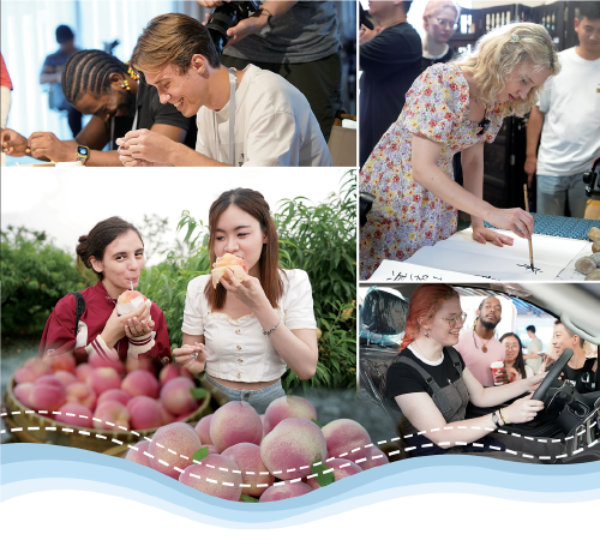
Young people from around the world visit Wuxi, Jiangsu, exploring its rural revitalization efforts through agriculture, entrepreneurship, and high-tech industry.
On June 27 and 28, a group of 10 young people from various countries, including Russia, the United States, Iran, Thailand, and Grenada, set out on a journey to Wuxi in East China's Jiangsu province, to explore the city's rural revitalization initiatives.
Their journey began in Yangshan county, where they witnessed the vibrancy of modern agriculture and saw how local villagers used the age-old tradition of peach cultivation to generate wealth through the integration of technology and innovative thinking.
Abalfazl Delkhasteh, a 29-year-old Iranian student at Tsinghua University and a content creator on the Chinese video platform Bilibili with over 25,000 followers, was particularly impressed with the quality of the local peaches.
"I was amazed to see that a single peach could yield enough juice to fill an entire cup," he said. "Another memorable experience was learning that peaches originated from China and were brought to Iran about 2,000 years ago through the ancient Silk Road."
During his visit to a peach orchard owned by Zhang Yelin, a 30-year-old local farmer, Delkhasteh learned about the flourishing peach cultivation in Yangshan since the 1980s, which has now become an integral part of the locals' daily lives.
Zhang had previously worked at a prestigious accounting firm for several years after graduating from university, but she chose to return to her roots and establish her own business.
She explained to Delkhasteh that her decision to start a peach farm was made possible by the government's rural revitalization efforts.
"The local government has provided substantial policy support, creating more opportunities for young people in the region to showcase their talents," she said.
Delkhasteh observed that Zhang has brought new ideas to her farm, leading her team in developing innovative products and promoting their brand.
For example, she incorporated local stories into the packaging to highlight the cultural significance of their peaches. She provided real-time insights from the peach orchard through social media and live updates, building consumer trust. Her team also diversified into related products, including refined peach desserts and traditional Chinese snacks.
Half of Zhang's team comprises young employees born after 1995, including four university students who, like her, chose to return to their hometown.
"The local young people were very energetic and entrepreneurial. It was fascinating to see them engaged in these ventures, showing a strong commitment to their hometown and its development," Delkhasteh said.
The spirit and achievements of the local youth also left a lasting impression on Jiratchaya Phinyoworakul, a 23-year-old Thai student at Fudan University in Shanghai.
While savoring a special peach coffee at a village cafe established by a young entrepreneur, Phinyoworakul was surprised by the cafe's modern and aesthetically pleasing setting within a historic village.
"The decor is based on wood and warm tones, creating a very cozy atmosphere, and the peach coffee was so good," she said. "Wuxi really offers tourists a unique blend of urban and rural charm."
In Yangshan, efforts toward rural revitalization have been inclusive, ensuring that no villagers, especially those with disabilities, are left behind.
Yu Zhen, 31, is a skilled artisan specializing in peach wood and pit carving at a local innovation center. His life took a challenging turn at the age of 14 when he was struck by an immune illness that caused muscle atrophy, leaving him unable to walk independently.
Yu mentioned that the predecessor of this center was established in 2009 as a poverty alleviation institution for individuals with disabilities. Today, it provides employment opportunities for 18 people with disabilities.
"Since the Han Dynasty (206 BC-AD 220), the art of peach wood carving has been preserved as a traditional technique. Throughout history, these crafts have been considered auspicious blessings by the Chinese people," Yu explained to the international guests.
The innovation center has also introduced experiential workshops, allowing visitors to engage in this traditional craft firsthand.
"This initiative provides people with disabilities meaningful work and the chance to pursue what they love. It truly warmed my heart," Phinyoworakul said.
Melissa Baidak, a 24-year-old Russian student at Beijing Foreign Studies University, was impressed by the ecological farming model that integrates agriculture and livestock farming in Wanma village, another area within Wuxi.
Zhao Zhicheng, the village committee director, explained to Baidak their current method: raising ducks, frogs, and Australian blue lobsters in different experimental rice fields. These animals play a crucial role in pest and disease control, reducing the need for pesticides.
"This not only ensures consistent rice production but also allows the livestock to mature by the time the rice is ready for harvesting," Zhao told Baidak.
Upon reaching their final destination after a two-day journey, the young guests arrived at the SAIC Maxus Wuxi vehicle factory. Here, they observed the automated production line utilizing IoT (Internet of Things) technology, giving them a glimpse into what a "future factory" looks like.
"It was fascinating to see the production process of cars, especially the MG cars, which are also popular in Iran," Delkhasteh said. "This connection between the cars produced here and those I'm familiar with from Iran was particularly interesting."
Phinyoworakul, an economics student, saw her visit to Wuxi as an opportunity to apply her academic knowledge in a practical setting.
"This trip has shown me how to use what I learned in lectures in the real world, particularly in understanding the development of the Chinese economy over time and the role of rural industrialization," she said.
mengwenjie@i21st.cn










